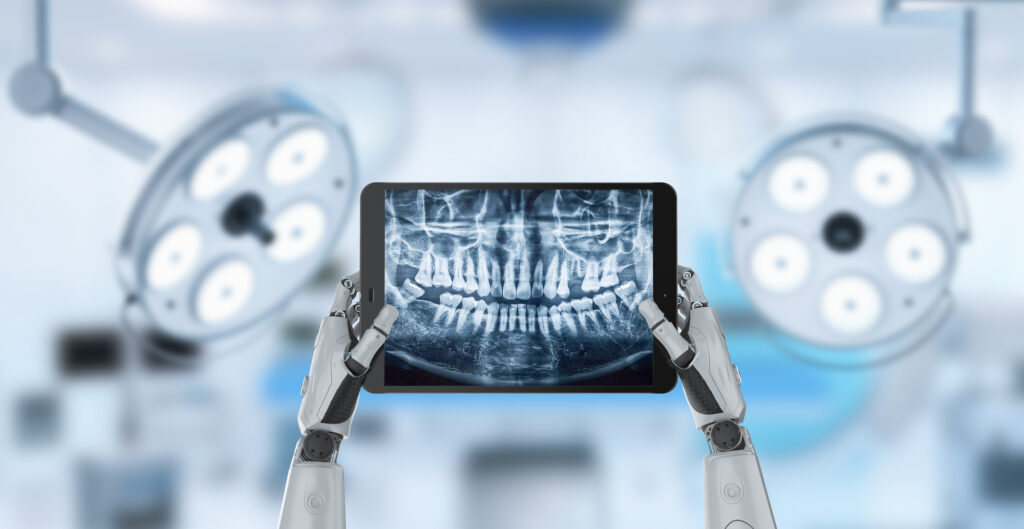
Artificial intelligence (AI) has revolutionized many industries, and now it’s making its way into dentistry. Imagine a future where your dentist uses advanced AI technologies to enhance your dental care experience. From diagnosing oral health conditions to performing precise treatments, the potential of AI in dentistry is vast. However, it’s important to understand that while AI can be a powerful tool for your dentist, it should never replace the human expertise and compassion that are vital in providing quality dental care. In this blog post, we will explore the advantages of using AI in dentistry, discuss areas where AI can be applied, address concerns and limitations surrounding its use, highlight the importance of human expertise in dental care, delve into ethical considerations associated with AI implementation, and glimpse into the promising future of AI in dentistry. So let’s dive in and discover how technology is transforming oral healthcare!
Advantages of Using AI in Dentistry
AI brings a multitude of advantages to the field of dentistry, enhancing both efficiency and accuracy. One key advantage is the ability to analyze vast amounts of patient data quickly. By feeding AI algorithms with dental records, x-rays, and other relevant information, dentists can obtain valuable insights that aid in diagnosis and treatment planning.
Additionally, AI-powered tools can assist in detecting oral health conditions at an early stage. With advanced image recognition technology, these tools can identify abnormalities or potential issues that may go unnoticed by human eyes alone. This allows for timely intervention and improved outcomes for patients.
Another advantage lies in the precision that AI offers during complex dental procedures. For instance, robotic assistance can ensure consistent drilling depths during implant placements or perform intricate tasks with high accuracy rates. This not only reduces errors but also minimizes discomfort for patients.
Furthermore, AI systems have the potential to streamline administrative tasks within dental practices. From appointment scheduling to insurance claim processing, automation through AI can free up valuable time for dentists and their staff to focus on providing personalized care.
Incorporating AI into dentistry presents numerous advantages such as efficient analysis of patient data, early detection of oral health conditions, precise execution of complex procedures using robotics or digital technologies and streamlining administrative processes within dental practices.
Areas of Dentistry Where AI Can Be Applied
AI technology is revolutionizing the field of dentistry, offering new possibilities to enhance patient care and improve treatment outcomes. Here are some key areas where AI can be applied in dentistry:
1. Diagnosis and Treatment Planning: AI algorithms can analyze medical images such as X-rays, CT scans, and intraoral photographs to aid in the early detection of dental conditions. By quickly identifying abnormalities or potential issues that may go unnoticed by human eyes, AI systems can assist dentists in making accurate diagnoses and developing effective treatment plans.
2. Dental Implantology: When it comes to dental implant placement, precision is crucial for successful outcomes. AI-guided software can provide virtual surgical planning, allowing dentists to precisely map out implant positioning based on each patient’s unique anatomy. This helps reduce the risk of complications and improves the overall success rate of implant procedures.
3. Oral Cancer Detection: Early detection plays a vital role in improving survival rates for oral cancer patients. With AI-powered tools, dentists can analyze tissue samples or perform automated oral screenings using advanced image recognition technology. These systems can identify suspicious lesions or abnormal cells with high accuracy, enabling timely intervention and potentially saving lives.
4. Patient Communication and Education: AI-driven chatbots or virtual assistants can effectively interact with patients by providing instant responses to their queries regarding common dental concerns like oral hygiene practices or post-operative care instructions. These user-friendly interfaces help educate patients about their specific dental conditions while promoting self-care habits between appointments.
5. Dental Research: Researchers are utilizing artificial intelligence techniques to expedite data analysis from large-scale studies related to genetic factors influencing oral health, epidemiology models predicting disease patterns and drug discovery targeting specific dental disorders.
AI-assisted research methodologies have the potential to unlock new insights that could lead to more personalized treatments tailored specifically towards individual patients.
As we continue exploring the applications of artificial intelligence in dentistry, the potential benefits are undeniable. However, it is important to remember that human expertise and judgment remain
Potential Concerns and Limitations of AI in Dentistry
While the integration of artificial intelligence (AI) into dentistry offers numerous advantages, it is important to consider the potential concerns and limitations associated with this technology. One major concern is the accuracy and reliability of AI algorithms. Although AI has shown remarkable capabilities in tasks such as image recognition, there is always a possibility of errors or misinterpretation when applied to dental diagnosis.
Another limitation is the lack of human touch and personalized care that patients may experience when relying solely on AI-driven dental tools. Dentistry involves not only technical expertise but also empathy and communication skills. Patients often seek comfort from their dentist during procedures, which might be lacking if an automated system is used instead.
Furthermore, privacy and security issues come into play when patient data is collected by AI systems. Safeguarding sensitive information becomes crucial to protect patients’ confidentiality rights.
Moreover, dentists need to be cautious about over-reliance on AI tools without adequately verifying or validating their results. Relying blindly on machine-generated reports could potentially lead to missed diagnoses or incorrect treatment plans.
Additionally, cost can be a limiting factor for implementing advanced AI technologies in dental practices. The high initial investment required for acquiring and maintaining these systems may pose challenges for smaller clinics or those operating under limited budgets.
Despite these concerns and limitations, it’s essential to highlight that human expertise remains indispensable in dental care. Dentists possess years of education, training, experience, intuition, and judgment that cannot yet be replicated by machines alone.
Incorporating AI as a tool rather than a replacement empowers dentists with valuable insights while still allowing them to exercise their professional judgment based on comprehensive patient assessments.
By recognizing both the potential benefits offered by AI in dentistry along with its possible limitations, we can strive towards achieving optimal oral healthcare outcomes through an intelligent blend of technology and human expertise
The Importance of Human Expertise in Dental Care
When it comes to dental care, having a great team of dentists is still the best thing for there is no denying the importance of human expertise. While AI in dentistry has great promise as a tool for dentists, it should not be seen as a replacement for skilled professionals.
Why is human expertise so crucial in dental care? Well, first and foremost, dentistry is about more than just diagnosing and treating oral health issues. It’s also about building relationships with patients and providing personalized care. A dentist’s ability to listen to their patients’ concerns, understand their unique needs, and develop tailored treatment plans cannot be replicated by artificial intelligence.
Additionally, dentistry requires a level of manual dexterity that machines simply do not possess. From performing delicate procedures like root canals to fitting crowns or braces accurately, these tasks require the skillful touch of a trained dentist.
Furthermore, while AI algorithms may analyze vast amounts of data quickly and efficiently, they are limited by the quality of input data available to them. Human expertise plays a critical role in interpreting this data correctly and making informed decisions based on individual patient circumstances.
Lastly but importantly, dental care involves ethical considerations that go beyond simply treating symptoms or conditions. Dentists must navigate complex situations such as addressing patient fears or anxieties around treatment or discussing sensitive topics like oral hygiene habits effectively – areas where human empathy and understanding are invaluable.
While AI has its place in dentistry as an aid to enhance efficiency and accuracy, dentists using artificial intelligence should remember that human expertise remains pivotal for delivering high-quality dental care.
Ethical Considerations of Using AI in Dentistry
When it comes to incorporating artificial intelligence (AI) into the field of dentistry, there are several ethical considerations to keep in mind. One of the main concerns is patient privacy and data security. With AI technology collecting and analyzing vast amounts of sensitive patient information, it’s crucial for dental practices to have robust security measures in place to protect this data from unauthorized access or breaches.
Another ethical consideration is ensuring that AI tools are used responsibly and accurately. While AI has the potential to enhance diagnostic capabilities and treatment planning, human oversight is essential. Dentists must remain actively involved in interpreting AI-generated results and making final decisions regarding patient care.
Additionally, transparency surrounding the use of AI is vital. Patients should be informed about how their data will be collected, stored, and utilized by AI systems within dental practices. This transparency fosters trust between patients and dentists using innovative technologies.
Furthermore, there may be concerns about biases within AI algorithms when it comes to diagnosing conditions or recommending treatment plans. It’s crucial for developers and healthcare professionals alike to address these biases proactively through ongoing research, training models on diverse datasets, and regularly auditing algorithms.
Another ethical consideration revolves around accessibility issues. Not all patients may have equal access to advanced dental technologies like AI due to factors such as cost or geographic location disparities. Dental professionals need to ensure that they continue providing quality care regardless of whether or not they incorporate AI into their practice.
While there are many exciting possibilities with integrating artificial intelligence into dentistry, ethical considerations must remain at the forefront. Patient privacy protection, responsible use of technology with human oversight,
transparency with patients regarding data usage, addressing biases within algorithms, and ensuring equal access for all individuals are all critical aspects that need careful attention when implementing AI tools in dental practices.
By taking these considerations seriously, we can harness the power of AI while upholding ethical standards in the dental profession.
The Future of AI in Dentistry
As we look ahead, it is clear that AI has a bright future in dentistry. The potential applications and benefits are vast, from improving diagnosis accuracy to enhancing treatment planning and patient care. However, it is important to remember that while AI can be a powerful tool for dentists, it should not replace the expertise and human touch provided by dental professionals.
And a warning regarding using it for content creation – your website may be penalised for AI content so always employ professional writers to create original content or you may use your source of patients and income.
In the coming years, we can expect to see even more advancements in AI technology specifically tailored for dentistry. Machine learning algorithms will continue to evolve and become more sophisticated, allowing for better analysis of dental images and data. This could lead to earlier detection of oral diseases and more personalized treatment plans.
Additionally, as AI becomes integrated into dental practices worldwide, there may be improvements in workflow efficiency. Automating certain tasks such as appointment scheduling or insurance processing could free up time for dentists to focus on providing quality care to their patients.
However, ethical considerations must also be taken into account as AI becomes more prevalent in dentistry. Privacy concerns regarding patient data need strict regulations and safeguards to protect sensitive information.
The future of AI in dentistry lies at the intersection of technology and human expertise. By harnessing the power of artificial intelligence alongside skilled dental professionals’ knowledge and experience, we can revolutionize oral healthcare delivery.
So while AI shows great promise as a valuable tool for your dentist – assisting with diagnostics, treatment planning and improved patient outcomes – it should always complement rather than replace human involvement.
This way, dentists using artificial intelligence-powered tools along with their professional judgment will ensure optimal results when treating their patients’ oral health needs.
AI truly has transformative potential within the field but its successful integration relies on striking a balance between advanced technology innovation and maintaining essential human connection within clinical practice.




